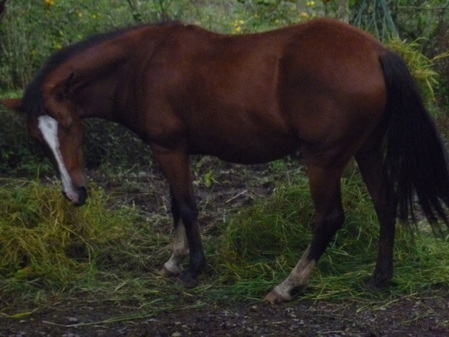Still, riding is popular and not only with girls. Working men use their horses as transportation; Men who do not commute on horseback, do the parade thing instead. It is considered very manly to ride your horse dressed up to the nines in the local horse parades called Cabalgatas. In fact, the Cabalgata is a big part of the culture here. There are Cabalagatas all year long but November is particularly dotted with opportunities to strut your stuff. This means, dressing up in your best cowboy outfit, sharpest longest spurs, horse in silver plated tack, and riding around town with your friends.
So, enter Sugar...........a Paso mare of diminutive stature, just in time for the November Cabalgatas. Sugar is of an unusually sweet nature as her name implies. She used to take tourists on rides up and down the mountains. Now, if she passes her vet check, by the end of the week she will be Beatrice's 'first pony'. I have a feeling those two might have a different take on how to dress for a horse parade. Think pink princesa.
Pasos are the traditional coffee farmers horse. To us English riders, they are really rather small ponies (mostly shorter than a coffee bush) that trot funny. They were used by the farmer ride through the rows of coffee. Their very smooth gait, enables the rider to just sit there during the 'trot - a real armchair ride. It is also a sure footed horse to cover rough terrain at some speed as most of the feet are on the ground at the same time when it 'trots'.
Size does matter: Men do like to be seen on a bigger rather than a smaller pony but on the whole the average Panamanian man is, to put it politely, of neat proportions. These ponies are well up to the job.
On our coffee farm, Sugar will have two jobs. As well as helping Beatrice on the way to the 2032 Olympics, she will also be supplying me with organic fertilizer. Really, I could do with 3 or 4 organic fertilizer factories, but for now, just one small Sugar with our coffee is just ample, bastante as the locals would say.




 RSS Feed
RSS Feed
